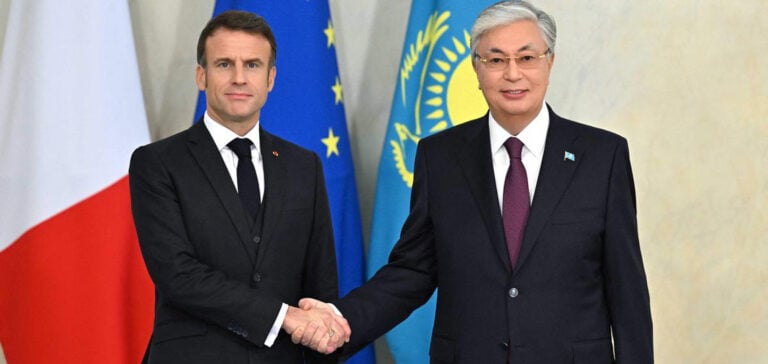Emmanuel Macron has begun a diplomatic visit to Central Asia, starting in Kazakhstan and continuing in Uzbekistan. France is seeking to strengthen its presence in this region, which is the scene of a competition for influence between Russia, China and Europe. What’s more, these two countries are among France’s main suppliers of uranium, making this visit all the more crucial.
Emmanuel Macron’s visit to Central Asia
The presidential plane landed in Astana, the capital of Kazakhstan, and Emmanuel Macron immediately began talks with his counterpart, Kassym-Jomart Tokayev. Contracts have been signed in various sectors, including pharmaceuticals and aeronautics. In addition, a Franco-Kazakh business forum has been opened to stimulate economic cooperation between the two countries.
The economic stakes of the visit
France aspires to play a major role in the project to build Kazakhstan’s first nuclear power plant, the fate of which will be decided by referendum by the end of the year. The region is also rich in critical metals, essential for the energy transition, which is of particular interest to France. Uranium specialist Orano, which already operates a mine in Kazakhstan, is also looking to expand its presence.
Kazakhstan is a key partner for France as the fifth-largest foreign investor, largely thanks to the presence of TotalEnergies, which jointly operates the Kachagan field in the Caspian Sea. In 2022, bilateral trade reached 5.3 billion euros, mainly in the hydrocarbons sector. What’s more, Kazakhstan supplies nearly 40% of France’s uranium requirements.
Competition for influence in Central Asia
Central Asia, once dominated by Russia, is now the center of attention for the major powers, while Russia is engaged in a military offensive in Ukraine. China has already taken the lead with its “New Silk Roads” project, but Europe and Turkey are also seeking to strengthen their influence in the region.
Against this backdrop of intense diplomatic activity, Hungarian Prime Minister Viktor Orban and Turkish President Recep Tayyip Erdogan will follow in Emmanuel Macron’s footsteps with a visit to Astana. Kazakhstan and Uzbekistan are banking on economic openness and balanced diplomacy to consolidate their position, while maintaining ties with Moscow, an essential partner.
The challenges of human rights and democracy
Emmanuel Macron, despite a busy international agenda, expresses his support for the sovereignty of both countries and their desire to diversify their partnerships. It seeks to strengthen bilateral economic ties, cooperate on major climate issues and promote French diplomacy towards the region’s youth. France has long shown an interest in this region, being the first European country to visit after the fall of the Soviet Union.
Finally, although the main focus of this visit is on the economic aspects, it should not be forgotten that these two Central Asian republics, despite their economic openness, remain authoritarian regimes where the repression of demonstrations can be violent. Despite signs of political liberalization, authoritarian regimes are still firmly in place, as witnessed by the violent repression of demonstrations in 2022.
Emmanuel Macron’s visit to Central Asia is an important step in strengthening ties between France, Kazakhstan and Uzbekistan. This fast-changing region is the scene of competition between the great powers, and France is seeking to play a leading role. This visit highlights the importance of the economic stakes, notably access to uranium and critical metals, as well as France’s diplomacy of influence. However, it also underlines the need to take into account the challenges of human rights and democracy in these authoritarian regimes.






















